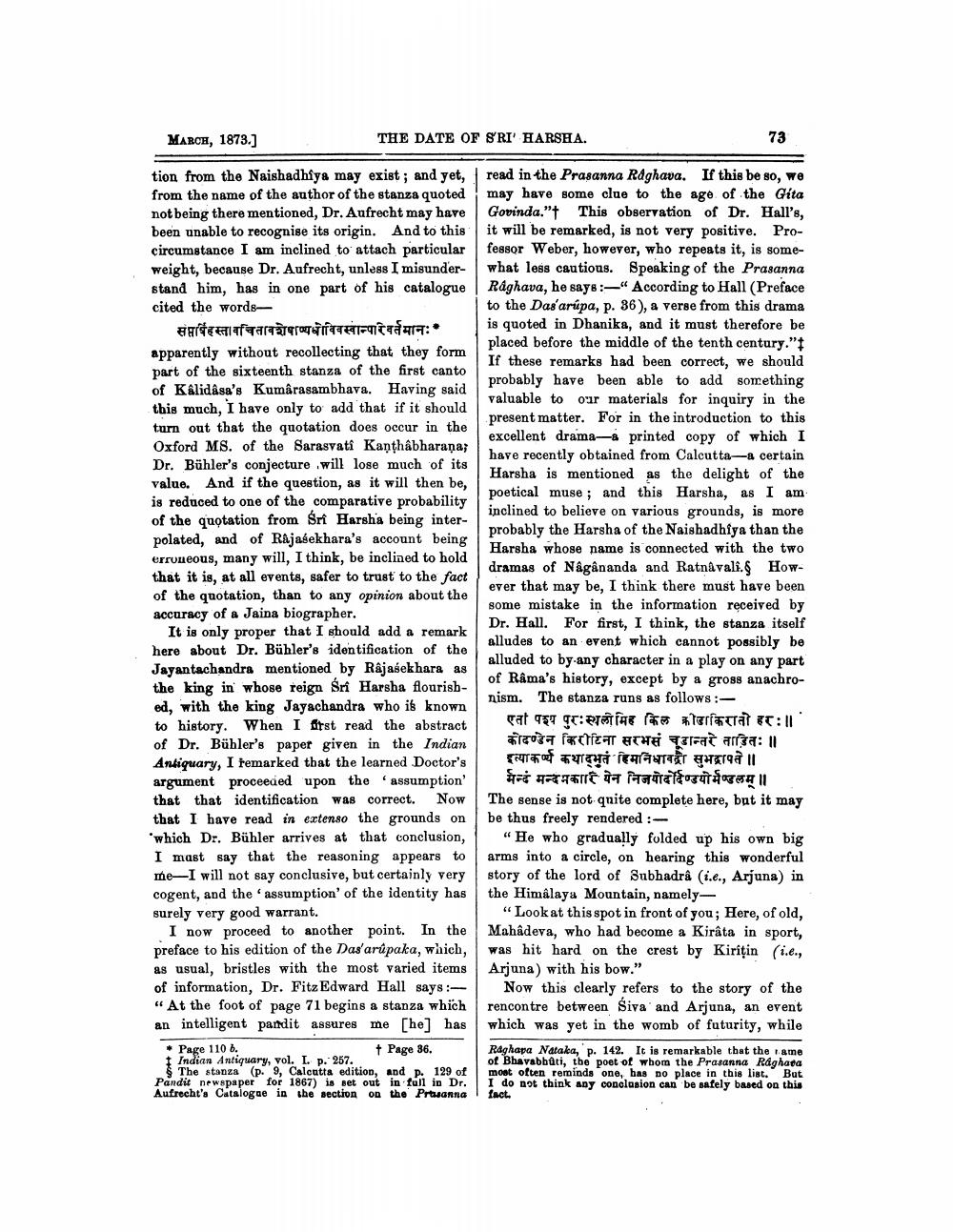________________
MARCH, 1873.]
tion from the Naishadhiya may exist; and yet, from the name of the author of the stanza quoted not being there mentioned, Dr. Aufrecht may have been unable to recognise its origin. And to this circumstance I am inclined to attach particular weight, because Dr. Aufrecht, unless I misunderstand him, has in one part of his catalogue cited the words
THE DATE OF SRI' HARSHA.
सप्तर्षिहस्त चितावशेषाव्यधोविवस्वान्परिवर्तमानः • apparently without recollecting that they form part of the sixteenth stanza of the first canto of Kâlidâsa's Kumarasambhava. Having said this much, I have only to add that if it should turn out that the quotation does occur in the Oxford MS. of the Sarasvati Kanthabharana; Dr. Bühler's conjecture will lose much of its value. And if the question, as it will then be, is reduced to one of the comparative probability of the quotation from Sri Harsha being interpolated, and of Rajasekhara's account being erroneous, many will, I think, be inclined to hold that it is, at all events, safer to trust to the fact of the quotation, than to any opinion about the accuracy of a Jaina biographer.
It is only proper that I should add a remark here about Dr. Bühler's identification of the Jayantachandra mentioned by Rajasekhara as the king in whose reign Śri Harsha flourished, with the king Jayachandra who is known to history. When I first read the abstract of Dr. Bühler's paper given in the Indian Antiquary, I remarked that the learned Doctor's argument proceeded upon the assumption' that that identification was correct. Now that I have read in extenso the grounds on 'which Dr. Bühler arrives at that conclusion, I must say that the reasoning appears to me-I will not say conclusive, but certainly very cogent, and the assumption' of the identity has surely very good warrant.
I now proceed to another point. In the preface to his edition of the Das'arûpaka, which, as usual, bristles with the most varied items of information, Dr. Fitz Edward Hall says:"At the foot of page 71 begins a stanza which an intelligent pandit assures me [he] has + Page 36.
Page 110 b.
Indian Antiquary, vol. I. p. 257.
The stanza (p. 9, Calcutta edition, and p. 129 of Pandit newspaper for 1867) is set out in full in Dr. Aufrecht's Catalogue in the section on the Prtuanna
73
read in the Prasanna Raghava. If this be so, we may have some clue to the age of the Gita Govinda." This observation of Dr. Hall's, it will be remarked, is not very positive. Professor Weber, however, who repeats it, is somewhat less cautious. Speaking of the Prasanna Raghava, he says:-" According to Hall (Preface to the Dasarupa, p. 36), a verse from this drama is quoted in Dhanika, and it must therefore be placed before the middle of the tenth century."+ If these remarks had been correct, we should probably have been able to add something valuable to our materials for inquiry in the present matter. For in the introduction to this excellent drama-a printed copy of which I have recently obtained from Calcutta-a certain poetical muse; and this Harsha, as I am Harsha is mentioned as the delight of the
inclined to believe on various grounds, is more
probably the Harsha of the Naishadhiya than the
Harsha whose name is connected with the two dramas of Nâgânanda and Ratnavali.§ However that may be, I think there must have been some mistake in the information received by Dr. Hall. For first, I think, the stanza itself alludes to an event which cannot possibly be alluded to by any character in a play on any part of Râma's history, except by a gross anachronism. The stanza runs as follows:
rat पप पुरःस्थली मिह किल क्रीडाकिरातो हरः ॥ कोदण्डेन किरीटिना सरभसं चूडान्तरे ताडितः ॥ conaf zugyi tentaret querna || मन्दं मन्दमकार येन निजयो दोर्दण्डयो मेण्डलम् ॥ The sense is not quite complete here, but it may be thus freely rendered :
"He who gradually folded up his own big arms into a circle, on hearing this wonderful story of the lord of Subhadrâ (i.e., Arjuna) in the Himalaya Mountain, namely
"Look at this spot in front of you; Here, of old, Mahadeva, who had become a Kirâta in sport, was hit hard on the crest by Kirițin (ie., Arjuna) with his bow."
Now this clearly refers to the story of the rencontre between Siva and Arjuna, an event which was yet in the womb of futurity, while
Raghava Nataka, p. 142. It is remarkable that the ame of Bhavabhuti, the poet of whom the Prasanna Raghava most often reminds one, has no place in this list. But I do not think any conclusion can be safely based on this fact.




